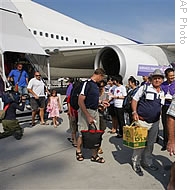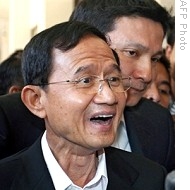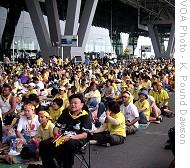voa标准英语2008-Anti-Government Protests End in Bangkok, but Unc(在线收听)
Thai officials began cleaning up Bangkok's airports.
 |
| Passengers from a Thai Airways flight come out from the plane after arriving at Suvarnabhumi international airport in Bangkok, Thailand, 03 Dec 2008 |
Earlier in the day, the anti-government People's Alliance for Democracy ended its eight-day siege of the terminals. And the first passenger flights in a week arrived at the international airport.
The blockade left hundreds of thousands of travelers stranded. Airport officials say it will be several days before operations are back to normal.
Since May, the PAD has campaigned against the government, accusing it of acting as a proxy for former Prime Minister Thaksin Shinawatra.
The protests ended after a court ruling dissolved three governing coalition parties, led by the People's Power Party, for breaking election laws.
 |
| Somchai Wongsawat, left, talks to reporters after court dissolves ruling party and bans him from politics, in Chiang Mai, 02 Dec 2008 |
The decision ended the 77-day government of Prime Minister Somchai Wongsawat.
But members of the banned groups shifted to new parties, and they continue to dominate parliament.
Sunai Pasuk, with Human Rights Watch here, says next the parties will select a new prime minister. But he says that will not necessarily end the political tensions.
"I would say at this point this is only the end of Act One; we are having a cool-off period until the selection of prime minister, that will start next week on the seventh, eighth and ninth of December. These will be three critical days," said Sunai.
If the PAD sees the new prime minister as being too close to Mr. Thaksin, the protests could resume. The PAD considers Mr. Thaksin, who was ousted in a coup two years ago, corrupt and authoritarian. He has fled the country to avoid corruption charges.
 |
| Protesters at main international airport in Bangkok, 26 Nov 2008 |
However, Sunai says Mr. Thaksin's supporters are increasingly frustrated by what they see as a lack of official impartiality in dealing with the PAD, which occupied a government office compound and the airports without punishment.
Pro-government groups also accuse the judiciary of bias against Mr. Somchai's government. Sunai says the political situation remains unsettled.
"The situation remains very fluid - with all these factors together - the PAD can come back anytime - Thaksin's side remains defiant and it is very likely to take control of the government again so we are back to square one," said Sunai.
Kraisak Choonhavan, a member of the opposition Democrat Party, says the outlook appears bleak, with only a slight chance of the governing coalition breaking up.
But Kraisak does not expect the PAD to begin new protests soon. He says it is now up to parliament to find a way through the political crisis.
"There is a chance in the very near future here we are able to go back to the parliament and do the job we can and maintain democracy - as crippled as it is - to make it work somehow," said Kraisak.
He says the governing coalition is likely to be weaker this time around, and the government will to have to call an election in 2009.
Thailand's current political crisis is the most severe in 16 years. It has pitched Mr. Thaksin's supporters in the rural and urban working class against the middle class and urban elite who make up the PAD.